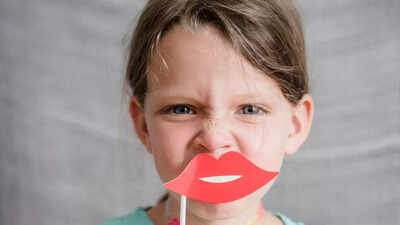ARTICLE AD BOX

Why Do Kids Swear and How Can Parents Prevent It? (Image: Pexels)
Kids swear sometimes as a one-off but sometimes it becomes a habit hence, it is important for parents to understand why children pick up profanity and what parents, teachers and caregivers can do about it.
Decades of studies suggest that children’s use of taboo language is shaped by social learning (who they hear it from), emotional needs (anger, stress, catharsis), developmental control (impulse regulation), media exposure and the responses adults give (punishment, laughter or attention). Understanding the why helps you respond in ways that stop the behaviour without escalating it.
They learn it from adults who model it (parental/family influence)
Parents’ language is the single most powerful model children have so, watch and clean up your own vocabulary because if children hear profanity used by caregivers, they are more likely to use it too. According to a 2013 study published in Child Development, mothers' and fathers' harsh verbal discipline at age 13 predicted an increase in adolescent conduct problems.
This longitudinal study showed that parents’ harsh verbal behaviour (yelling, insults, swearing) is linked with later conduct problems in teens hence, modelling matters.
Peers normalise and spread profanity (peer influence)
Peer groups use swear words as markers of solidarity or toughness and kids imitate to fit in. Parents should monitor not just the home but also their kids' friend circles and social settings. Exposure to profanity among family and peers predicts frequency of swearing.
Multiple studies find that children match the language of close friends and family.
Media exposure teaches taboo words (TV, movies, music)
Media acts like a large and repetitive model, especially for older children and teens. Screen supervision by parents and content filters matter so have conversations about what kids watch. A 2011 study in Pediatrics found that exposure to profanity in media was directly related to beliefs and behaviour regarding profanity use and indirectly to aggressive behaviour.
A national sample showed that kids who see profanity frequently in TV, movies or online are more accepting of and likely to use such language.
Swearing can be an emotional outlet or “catharsis”
For children with limited emotion-language skills, a swear word can be a quick release. Teach children the vocabulary for emotions and healthy outlets (words and actions) so that they do not default to swearing. A 2023 study in Depression Research and Treatment established that profanity can be used for emotional catharsis as swearing is a natural response to release stress.
Survey and literature analysis show that people sometimes use profanity to release strong feelings (anger, frustration, pain).
Impulse control and executive function limits (age, ADHD)
Kids and especially those with attention or impulse-control problems sometimes blurt taboo words before they have had time to filter them. It is a self-control issue as much as a moral one. Parents should strengthen delay and inhibition skills (games, routines, explicit practice) in kids and consider professional assessment if impulsivity is severe.
Work on inhibitory control and ADHD as younger children and those with poorer executive control act out verbally.
A general finding in studies has been that poor inhibitory control makes it harder to stop blurting taboo words under stress.
Swearing reduces pain or stress physiologically so it 'works'
If kids discover that swearing “works” to vent or to get attention, they may reuse it. Replace the “effectiveness” of swearing by teaching alternatives that give emotional release (deep breaths, stomp it out, “I’m mad” scripts). As per a 2009 study in NeuroReport, swearing increased pain tolerance along with increased heart rate and decreased perceived pain.
Experimental work shows swearing can trigger a fight-or-flight arousal that temporarily reduces pain or stress.
Attention-seeking and reinforcement (positive or negative)
Children quickly learn whether swearing earns laughs, scolds, or lost privileges. If swearing reliably gets attention, even negative attention, it can be reinforced and repeated. Harsh punishments sometimes backfire so avoid dramatic over-reaction by using calm, consistent consequences and, crucially, praise for positive language. Researchers in a 2006 study, Memories of Punishment for Cursing, noted that parental punishments or dramatic reactions are memorable and shape later behaviour.
Testing boundaries/autonomy (developmental push)
Saying taboo words is a convenient way for young children to test adult reactions and assert independence, especially around 6–12 years when social rules are explored. Treat boundary-testing as normal by setting clear rules, explaining why and giving small, immediate consequences. A 2013 study, Developmental analyses of preschool/school-age behaviour, revealed that by school age children “have the rudiments of adult swearing” and social rules slot in as they grow.
Cultural or group norms (what’s acceptable varies)
In some families or peer groups, mild cussing is normal and not stigmatised hence, kids reflect the norms they see most often. Know the norms that your child is internalising at home, school, sports, online and coach them on when language is appropriate. Research in cross-cultural and sociolinguistic reviews shows profanity’s acceptability varies with gender, culture and group identity.
Habit and repeated exposure (normalisation over time)
Repetition or hearing words over and over on screens or at home makes them easier to use.
Over time, the shock value fades and kids may increase frequency. Parents can interrupt the repetition loops by limiting exposure and creating new ritual language habits (family slogans, allowed words). A 2011media exposure work plus daily-use habit research found that media exposure to profanity is related to later profanity use.Children swear for many reasons including media, peer pressure, emotion regulation, impulse control and reinforcement but the most effective strategy is a calm, consistent approach that reduces exposure, teaches emotion language and self-control and replaces attention-earning swears with healthier alternatives.
Get the latest lifestyle updates on Times of India, along with Solar Eclipse 2025, date and visibility!



.png)
.png)
.png)
















 1 hour ago
6
1 hour ago
6









 English (US) ·
English (US) ·